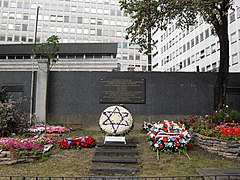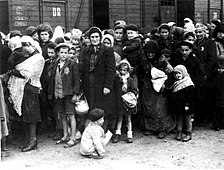
Back Velodrom d'Hiv basqını Azerbaijani Skrapadeg ar Vélodrome d'Hiver Breton Batuda del Velòdrom d'Hivern Catalan Deportace na Zimní velodrom v Paříži Czech Vel d'Hiv-opsamlingen Danish Rafle du Vélodrome d’Hiver German Rastado de la Vintra Ciklodromo Esperanto Redada del Velódromo de Invierno Spanish Neguko Belodromoaren sarekada Basque بهصفکشی ول دیو Persian
 Memorial garden at the former Vel d'Hiv location | |
| Native name | Rafle du Vélodrome d'Hiver |
|---|---|
| English name | Vel' d'Hiv' Roundup |
| Date | July 16–17, 1942 |
| Location | Paris |
| Organised by | |
| Participants | 7,000–9,000 French police and Gendarmerie |
| Arrests | 13,152 people[1]
|
| Part of a series on |
| The Holocaust |
|---|
 |
The Vel' d'Hiv' Roundup ( [vel ˈdiv] vell-DEEV; from French: la rafle du Vel' d'Hiv', an abbreviation of la rafle du Vélodrome d'Hiver) was a mass arrest of Jews in Paris on 16–17 July 1942 by Vichy French police at the behest of the German occupational authorities. Occurring during World War II, Jews arrested during the roundup were deported to Nazi Germany and targeted for extermination as part of the Holocaust. It was one of several measures aimed at eradicating French Jews in both the area of France under direct German occupation and the so-called "zone libre" that took place in 1942 as part of Opération Vent printanier (Operation Spring Wind). Planned by René Bousquet, Louis Darquier de Pellepoix, Theodor Dannecker and Helmut Knochen, the roundup was the largest deportation of Jews from France.
According to Paris Police Prefecture records, 13,152 Jews were arrested,[1] including 4,115 children.[2] They were confined in the Vélodrome d'Hiver, an indoor sports arena, in extremely crowded conditions without any arrangements made for food, water or sanitary facilities. In the week following the arrests, arrested Jews were taken to the Drancy, Pithiviers and Beaune-la-Rolande internment camps[2] before being deported in cattle cars to Nazi concentration camps, primarily Auschwitz.
In the view of President Charles de Gaulle's administration and the successive French governments, France could not be held accountable for the roundup since the Vichy state was "both illegal and illegitimate". President François Mitterrand refused to acknowledge the responsibility of the French state, stating that "Vichy was not the Republic". Only in 1995, in contrast with the silence of his predecessors, did President Jacques Chirac apologise for the role of French police and civil servants in the roundup, calling it "the darkest hours that will forever tarnish our history". In 2017, President Emmanuel Macron more specifically admitted the responsibility of the French state in the roundup and hence in the Holocaust in France.[3]
- ^ a b "Pourquoi le rafle n'a pas ateint son objectif" (PDF). AIDH.org. p. 52. Archived from the original on 3 July 2008. Retrieved 31 December 2009.
- ^ a b "The Vel' d'Hiv Roundup". The Holocaust in France. Yad Vashem. Retrieved 22 April 2014.
- ^ Goldman, Russell (17 July 2017). "Macron Denounces Anti-Zionism as 'Reinvented Form of Anti-Semitism'". Retrieved 27 March 2018 – via NYTimes.com.